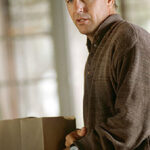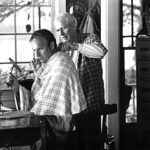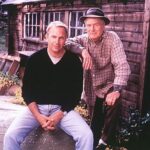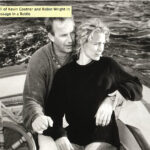Thrown to the waves, and to fate, the bottle could have ended up anywhere. Instead, it is found just three weeks after it begins its journey. Theresa Osborne, divorced and the mother of a twelve-year-old son, discovers it during a seaside vacation from her job as a Boston newspaper columnist. Inside is a letter that opens with, “My Dearest Catherine, I miss you my darling, as I always do, but today is particularly hard because the ocean has been singing to me, and the song is that of our life together….” For Garrett, the message is the only way he knows to express his undying love for a woman he has lost. For Theresa, wary of romance since her husband shattered her trust, the message raises questions that intrigue her. Challenged by the mystery, and driven to find Garrett by emotions she does not fully understand, Theresa begins a search that takes her to a sunlit coastal town and an unexpected confrontation. Brought together either by chance or something more powerful, Theresa and Garrett’s lives come together in a tale that resonates with our deepest hopes for finding everlasting love. Shimmering with suspense and emotional intensity, Message in a Bottle takes readers on a hunt for the truth about a man and his memories, and about both the heartbreaking fragility and enormous strength of love. For those who cherished The Notebook and readers waiting to discover the magic of Nicholas Sparks’s storytelling, here is an achingly lovely novel of happenstance, desire, and the choices that matter most.
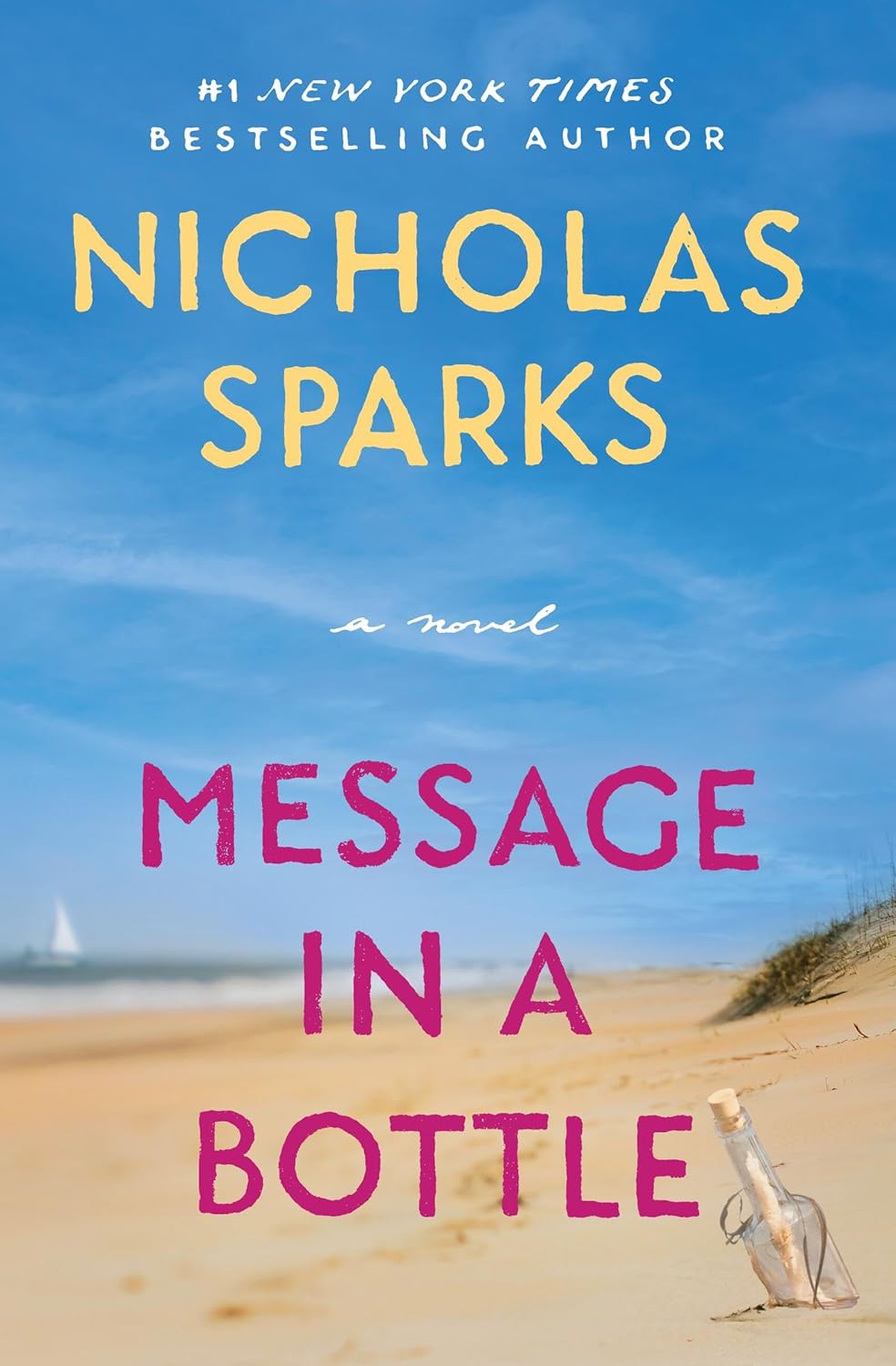
Thrown to the waves, and to fate, the bottle could have ended up anywhere. Instead, it is found just three weeks after it begins its journey. Theresa Osborne, divorced and the mother of a twelve-year-old son, discovers it during a seaside vacation from her job as a Boston newspaper columnist. Inside is a letter that opens with, “My Dearest Catherine, I miss you my darling, as I always do, but today is particularly hard because the ocean has been singing to me, and the song is that of our life together….” For Garrett, the message is the only way he knows to express his undying love for a woman he has lost. For Theresa, wary of romance since her husband shattered her trust, the message raises questions that intrigue her. Challenged by the mystery, and driven to find Garrett by emotions she does not fully understand, Theresa begins a search that takes her to a sunlit coastal town and an unexpected confrontation. Brought together either by chance or something more powerful, Theresa and Garrett’s lives come together in a tale that resonates with our deepest hopes for finding everlasting love. Shimmering with suspense and emotional intensity, Message in a Bottle takes readers on a hunt for the truth about a man and his memories, and about both the heartbreaking fragility and enormous strength of love. For those who cherished The Notebook and readers waiting to discover the magic of Nicholas Sparks’s storytelling, here is an achingly lovely novel of happenstance, desire, and the choices that matter most.
Inspiration
I had a choice after the success of The Notebook as to what kind of book I should write next. I could play it safe, I thought, and write a book that was essentially the same as The Notebook, one that dealt with the same theme of everlasting, unconditional love. That would have been easy since I’d already done it once and I had no doubt that I could make the story interesting. I could invent a couple of older characters, tell how they’d fallen in love in the beginning of their lives, add a “test” of some sort later in life, and have the love remain true throughout it all. Yet part of the magic of The Notebook was not knowing what was going to happen in the story, and no matter what I wrote, it would be impossible to recreate that “magic” since part of it came from “not knowing” what would happen in the story. I like to put it into these terms: Suppose you went to a magic show and saw a trick that enthralled you. Then later, while at home, you learn how the trick was performed. No matter what you did, the next time you saw the trick, you wouldn’t feel the same way you did the first time you saw it.
That’s what I thought would happen if I tried to write a novel that was exactly the same, and I figured that if I did that again, there would come a time that no one would read my books, since they already knew the story in advance.
I knew, however, that I had to write another love story, so I decided to change the story by using a different theme. This time, I chose the theme love after grief, and again I turned to my family for inspiration.
Message in a Bottle was inspired by my father after the death of my mother. In 1989, six weeks after I was married, my mother and father went horseback riding. They were avid riders and very comfortable on horses, and were simply walking the horses along a scenic trail. For a reason that no one can explain—we assume it was the horse, a rather skittish Arabian—my mom fell out of the saddle, off the horse, hit her head on a rock, had a cerebral hemorrhage and died.
My mother and father had married at the age of twenty-one and my father was absolutely crushed by her death. They’d been married twenty-seven years and my father didn’t have the slightest idea of what it meant to be a grown-up without my mom. A lot of people wear black to a funeral. My father wore black every day for four years. He pretty much became a recluse. He pulled away from his family and friends, he stopped going out, he stopped doing pretty much everything. All he did was go to work and back home again. It was heart-breaking to watch.
After four long years of worrying about him, my father finally started taking baby steps out in the world again. He started reconnecting with family and friends, eventually he started to date again—think more years passing—eventually he met someone in particular, eventually he fell in love again. And then one day, about seven years after my mom had died, I got a call from my father. “I’m engaged,” he said.
I was thrilled, not because I didn’t care about my mom—I adored her—but because I’d been so worried about my father. Kids worry about their parents the same way parents worry about their kids, and I was glad that he’d finally found someone.
Two days after that phone call, my father was driving home late one night, fell asleep at the wheel of his car, crashed, and died.
After the novel came out, there were times when I couldn’t believe the reaction to it. People were very upset by the ending. Even though I write tragedies, Garrett’s death at the end of the novel came as a surprise to many readers. Now that you understand the parallels with my father’s story, perhaps it makes sense now. Yet I want you to know that I didn’t write the story simply to “share the misery,” so to speak. Rather, I wrote it because of the lessons that I learned from what my father went through; namely, that no matter how hard and terrible life can be at times, it’s possible to move on. Because Garrett Blake had been able to move on no matter how painful it was—the theme was love after grief, remember—it should be obvious that one day, Theresa Osborne will fall in love again. That was, after all, the lesson behind the novel.
Wilmington, NC
Situated on the southeastern coast of North Carolina, Wilmington is a charming port city near the Cape Fear Coast beach community. Rich in naval history, Wilmington is a modern city with so much to see and do; from a WWII battleship to a Hollywood movie production studio, cobblestone streets with horse-drawn carriages to music festivals, history museums to contemporary art galleries, elegant restaurants to welcoming nightspots, Wilmington has something for everyone. Wilmington’s thriving beach community makes it the perfect location for chance encounters between lovers – young and old – in Nicholas Spark’s beloved novels, The Last Song, Dear John and Message in a Bottle.
Grieving widower Garret Blake builds boats for a living. Rebuilding his life-that's another matter. But that's before Theresa Osborne comes to his North Carolina village. Theresa, a lonely divorcee and researcher for the Chicago Tribune, knows that Garret is the author of the message she found inside a bottle on a Cape Code beach. And she knows the message spoke to her in away that profoundly touched her heart. Kevin Costner as Garret and Robin Wright Penn as Theresa bring high-voltage starpower to Message in a Bottle, a tale of love lost and found based on Nicholas Sparks' bestseller and directed by Luis Mandoki (White Palace, When a Man Loves a Woman). "You choose-the past or the future. Pick one and stick with it," Garret's spry father Dodge (Paul Newman) advises. The advice sticks. So does the impact of this tender, movingly filmed tale.
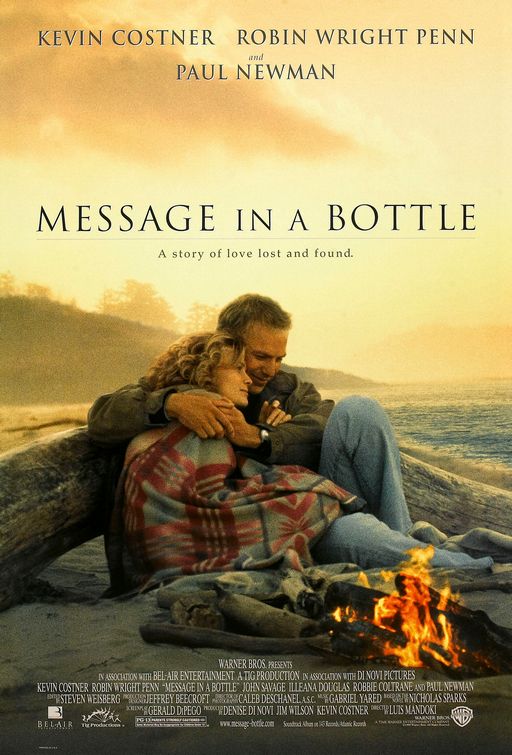
- Director: Luis Mandoki
- Screenplay: Gerald Dipego
- Cast: Kevin Costner, Robin Wright Penn, John Savage, Illeana Douglas, Robbie Coltrane
- Run Time: 131 minutes
Grieving widower Garret Blake builds boats for a living. Rebuilding his life-that's another matter. But that's before Theresa Osborne comes to his North Carolina village. Theresa, a lonely divorcee and researcher for the Chicago Tribune, knows that Garret is the author of the message she found inside a bottle on a Cape Code beach. And she knows the message spoke to her in away that profoundly touched her heart. Kevin Costner as Garret and Robin Wright Penn as Theresa bring high-voltage starpower to Message in a Bottle, a tale of love lost and found based on Nicholas Sparks' bestseller and directed by Luis Mandoki (White Palace, When a Man Loves a Woman). "You choose-the past or the future. Pick one and stick with it," Garret's spry father Dodge (Paul Newman) advises. The advice sticks. So does the impact of this tender, movingly filmed tale.


